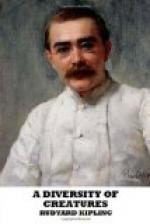High over Heaven the
lamps of midnight burned
Ere, weak with merriment,
the Four returned,
Not in that order they
were wont to keep—
Pinion to pinion answering,
sweep for sweep,
In awful diapason heard
afar,
But shoutingly adrift
’twixt star and star.
Reeling a planet’s
orbit left or right
As laughter took them
in the abysmal Night;
Or, by the point of
some remembered jest,
Winged and brought helpless
down through gulfs unguessed,
Where the blank worlds
that gather to the birth
Leaped in the womb of
Darkness at their mirth,
And e’en Gehenna’s
bondsmen understood.
They were not damned
from human brotherhood.
Not first nor last of
Heaven’s high Host, the Four
That night took place
beneath The Throne once more.
O lovelier than their
morning majesty,
The understanding light
behind the eye!
O more compelling than
their old command,
The new-learned friendly
gesture of the hand!
O sweeter than their
zealous fellowship,
The wise half-smile
that passed from lip to lip!
O well and roundly,
when Command was given,
They told their tale
against themselves to Heaven,
And in the silence,
waiting on The Word,
Received the Peace and
Pardon of The Lord!
‘My Son’s Wife’
(1913)
He had suffered from the disease of the century since his early youth, and before he was thirty he was heavily marked with it. He and a few friends had rearranged Heaven very comfortably, but the reorganisation of Earth, which they called Society, was even greater fun. It demanded Work in the shape of many taxi-rides daily; hours of brilliant talk with brilliant talkers; some sparkling correspondence; a few silences (but on the understanding that their own turn should come soon) while other people expounded philosophies; and a fair number of picture-galleries, tea-fights, concerts, theatres, music-halls, and cinema shows; the whole trimmed with love-making to women whose hair smelt of cigarette-smoke. Such strong days sent Frankwell Midmore back to his flat assured that he and his friends had helped the World a step nearer the Truth, the Dawn, and the New Order.
His temperament, he said, led him more towards concrete data than abstract ideas. People who investigate detail are apt to be tired at the day’s end. The same temperament, or it may have been a woman, made him early attach himself to the Immoderate Left of his Cause in the capacity of an experimenter in Social Relations. And since the Immoderate Left contains plenty of women anxious to help earnest inquirers with large independent incomes to arrive at evaluations of essentials, Frankwell Midmore’s lot was far from contemptible.




